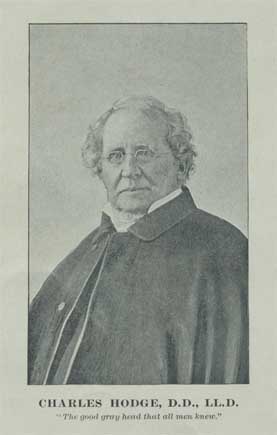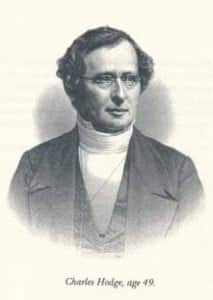So very long ago, when Dr. Charles Hodge was still a rather young man, he brought his inaugural lecture on the campus of Princeton Theological Seminary, on this day, November 7, in 1828. We will not reproduce the whole of his lecture here, but only his concluding remarks. To read the entire lecture, click the embedded link in the title. [emphasis has been added in the text below.]
INTRODUCTORY LECTURE. DELIVERED IN THE THEOLOGICAL SEMINARY, PRINCETON, N.J. NOV. 7, 1828.
BY CHARLES HODGE.
. . .
Now, brethren, if these things be so, if a man’s religious opinions are the result and expression of his religious feelings, if heterodoxy be the consequence rather than the cause of the loss of piety, then “keep your heads with all diligence, for out of them are the issues of life.” Remember that it is only in God’s light that you can see light. That holiness is essential to correct knowledge of divine things, and the great security from error. And as you see, that when men lose the life of religion, they can believe the most monstrous doctrines, and glory in them; and that when the clergy once fall into such errors, generations perish before the slow course of reviving piety brings back the truth; “what manner of men ought you to be in all holy conversation and godliness.” Not only then for your own sake, but for the sake of your children, and your children’s children, forsake not your God; who is our God, because he was the God of our fathers. The fate of future ages, rests with every present generation.
Again, beware of any course of life or study, which has a tendency to harden your hearts, and deaden the delicate sensibility of the soul to moral truth and beauty. There are two ways in which this may be done, a course of sin, and indulgence in metaphysical speculations on divine things. The reason, why such speculations produce this effect, is, that the views of truth thus taken are not of its moral nature, and of course produce no moral feeling, but the reverse. Let a man, when contemplating the grandeur of alpine scenery, begin to examine the structure of the mountains, and study their geological character; what becomes of his emotions of sublimity? Thus also religious truth, viewed, in the general, produces devotion; metaphysically analyzed it destroys it. Where is our reverence and awe of God, while prying into his essence or scrutinizing His attributes? Where are our feelings of penitence, when disputing on the origin of evil? Our sense of responsibility when discussing free-will and dependence? That it may be necessary to attend to these subjects, and get as far as possible definite ideas respecting them, no one will deny; but when our habitual views of truth, are of this nature, there is an end of all feeling on the subject. There is another remark, which may here be made. When a man prefers examining the geological structure of a mountainous region, to the contemplation of its grandeur; he only prefers the acquisition of knowledge to the enjoyment of an elevating emotion; but as the objects of his examination are external, and have no connexion with the emotions of his mind, his insensibility is no obstacle to his progress. But with regard to moral subjects the case is far different; the feelings destroyed by metaphysical investigation, are the very objects to be investigated, for their moral quality is their essence. If this be weakened or destroyed, there is nothing left; and a man in this state is no more qualified to speak on these subjects, than the deaf to discourse on music. This is the reason that metaphysicians so often advance doctrines, which the whole world know to be false, because they contradict the strongest moral feelings of the soul. Will the mass of pious people ever be brought to believe, that God is the author of sin?; that man is not free, and consequently not accountable?; that sin is not a moral evil, but mere imperfect development?; or the still more horrible opinion, that God himself, is merely the blind instinctive principle, which animates and constitutes the universe, of which neither moral nor intellectual qualities can be predicated? Yet metaphysicians teach all these doctrines. Look around you, brethren, and see if these things be not so. As far as my observation extends, it is the uniform tendency of such speculations to deaden the moral sensibility of the soul. Beware then of unhallowed speculations on sacred subjects. Bring all your doctrines to the test of God’s word and of holiness. Go with your new opinions to the aged children of God, who have spent years in close communion with the Father of lights. Propose to them your novel doctrines, should they shock their feelings, depend upon it, they are false and dangerous. The approbation of an experienced Christian of any purely religious opinion is worth more, than that of any merely learned theologian upon earth.
Finally, lean not to your own understanding. If there be any declaration of the Bible, confirmed by the history of the church, and especially by the recent history of European churches, it is that “he that leaneth to his own understanding is a fool.” When men forsake the word of God, and profess to be wise above that which is written, they inevitably and universally lose themselves in vain speculations. Look at the state of things, when every man is following the light of his own reason. Each boasts that he alone has the truth, and yet each is often a miracle of folly to every man but himself. True, such men are often men of great intellect; but can mere intellect perceive moral truth? Can man by wisdom find out God ? Can he find out the Almighty unto perfection? No man knoweth the Father but the Son and he to whom the Son shall reveal him. Submit yourselves, therefore, to the teaching of him, in whom “are all the treasures of wisdom and knowledge,” It is only when thus taught, that you will be able to teach others also.
One word more-—keep as you would your hold on heaven your reverence for Jesus Christ. Reverence for the Redeemer of sinners, is the very last feeling which deserts a falling Christian, or a sinking church. When all other evidence, and all other arguments for the Bible had lost their force, this solitary feeling has held up the soul from sinking into infidelity and thence into perdition. When this is lost, all is lost. The soul that is insensible to the glory of the Son of God, is “as a tree twice dead and plucked up by the roots.”


![Rev. Francis Blanchard Hodge [1838-1905]](https://thisday.pcahistory.org/wp-content/uploads/2013/05/hodge_Francis_Blanchard.jpg)
